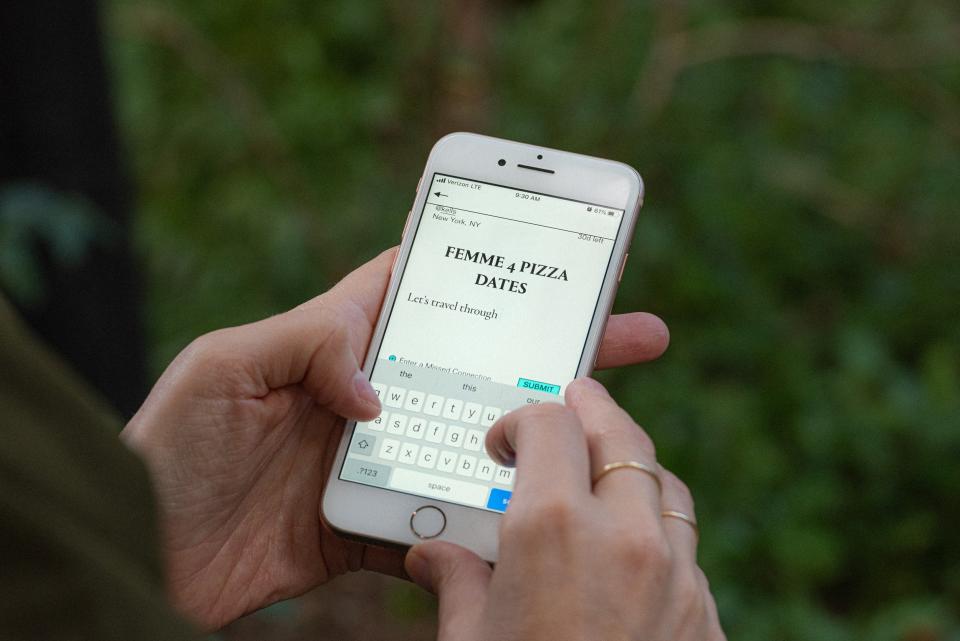This New Queer Dating App Wants You to Read, Not Swipe
Over the past few years, the rise of what The Atlantic termed “dating-app fatigue” in 2016 has turned into something closer to aversion. This summer analysts predicted that the rise of dating apps like Hinge, Bumble, and Tinder would slow in 2019. Slowly but surely, dating-app use has become the social equivalent of a visit to the DMV: tiresome but necessary.
This is the overcrowded market that the brand-new queer-focused dating app Lex is entering, but it draws on very different history than its predecessors. The industry-wide search for a “gay Tinder” has produced Grindr, which caters primarily to men and can alienate shier users with its meat-market sensibility as well as somewhat interchangeable woman-focused apps like Her and Scissr. Lex is distinctive because it isn’t trying to reinvent straight dating apps—instead, it pulls from the long history of queer personal ads.
Lex grew out of the queer missed-connection Instagram page @_personals_, explains founder Kelly Rakowski, adding that @_personals_—which was established in 2017—itself grew out of the @h_e_r_s_t_o_r_y Instagram, a page she built in 2014 to center images of lesbians throughout history.
“I was digging through the internet to find content for @h_e_r_s_t_o_r_y and came across these back issues of the lesbian erotica magazine On Our Backs, and at the back of every issue were personal ads by lesbians looking for love and sex.” Rakowski started screen-shotting these ads and eventually turned them into their own Instagram. Two years later, Lex was born as a dedicated, user-generated dating app. Rakowski ran a Kickstarter campaign to fund the app, raising almost $50,000, and with the help of a hired engineer and interns, she’s managed to bring queer history, alive and fighting, into the romance-tech arena.
Lex goes out of its way not to exclude anyone (except cis, straight men, that is) from its purview, billing itself as “a lo-fi, text-based dating & social app for lesbian, bisexual, asexual, & queer people. For womxn & trans, genderqueer, intersex, two-spirit, & non-binary people. For people of marginalized genders, inspired by old-school newspaper personal ads.”
That long list of accepted identities might lift some boomer eyebrows, but given that the queer dating scene can be a hotbed of transphobia, misogyny, and racism, the digital equivalent of an “All Are Welcome Here” banner feels deeply necessary (particularly after @_personals_ was accused of having a “white privilege problem” earlier this year).

Providing a space that isn’t for cis, straight men comes with risk, as the founders of the women’s co-working space The Wing learned when they were hit with a $12 million gender discrimination lawsuit. “The app isn’t for cis, straight men, but we can’t explicitly say that, so I had a lawyer look at the app’s text to make sure we weren’t going to be sued by men’s rights groups,” says Rakowski.
The idea of a queer dating app geared around words, not pictures, feels liberating; queerness is intrinsically multifaceted, and Lex is one of the first apps that seems to embrace the queer community’s complexity, not attempt to flatten it. This complexity was on display at the Lex launch party at Performance Space New York on November 16. Coat, scarf, and hat-clad revelers of all stripes filled the outdoor space, excitedly trading Instagram handles and sipping cider from local pop-up bar Butch Judy’s. When asked about the event’s 5 p.m. start time, Rakowski says with a laugh: “It’s lesbian hours.” Nonetheless, impromptu after-parties raged across Manhattan and Queens, with one Lex user telling me, half-jokingly, “I’m here to meet my wife!”
It might seem surprising for a dating app to draw an actual, IRL crowd—it’s hard to imagine Tinder or Grindr users flooding a local meet-up in quite the same way—but part of Lex’s popularity comes from the way it can make a city as large as New York feel like a small town. Missed connections abound on Lex, seeking everyone from “Librarian Glasses” to “G Train and Blue Scarf,” and Rakowski reports that the total number of ads posted since the app’s release has already hit 12,000.
As gay bars are increasingly few and far between across the United States, with only three explicitly lesbian bars remaining even in liberal New York City, the potential of an app like Lex to create a definitively queer social space feels expansive.
Lex users can choose to link their Instagram accounts to their personal ads, so it’s not as if there’s no avenue for an additional visual component to the browsing, but users get the humble, local-paper thrill of a personal ad with the instant gratification of reaching a worldwide community immediately. “We’re not saying, ‘Don’t ever check out a person,’ but Lex is more about getting to know someone first through their words before just looking at some selfie and swiping them away forever,” Rakowski says.
Originally Appeared on Vogue

